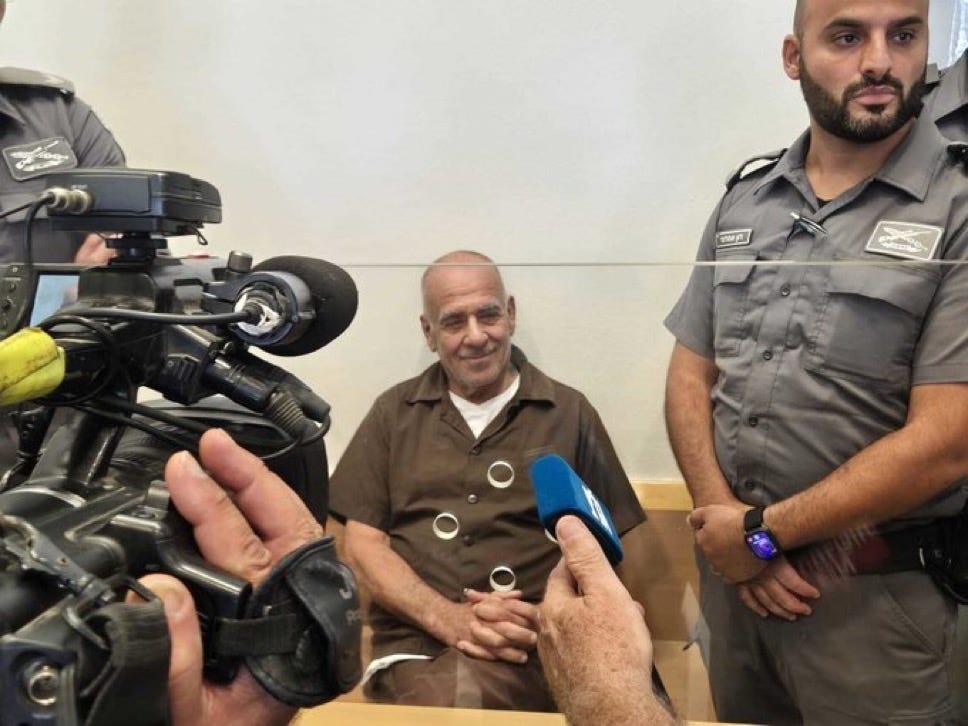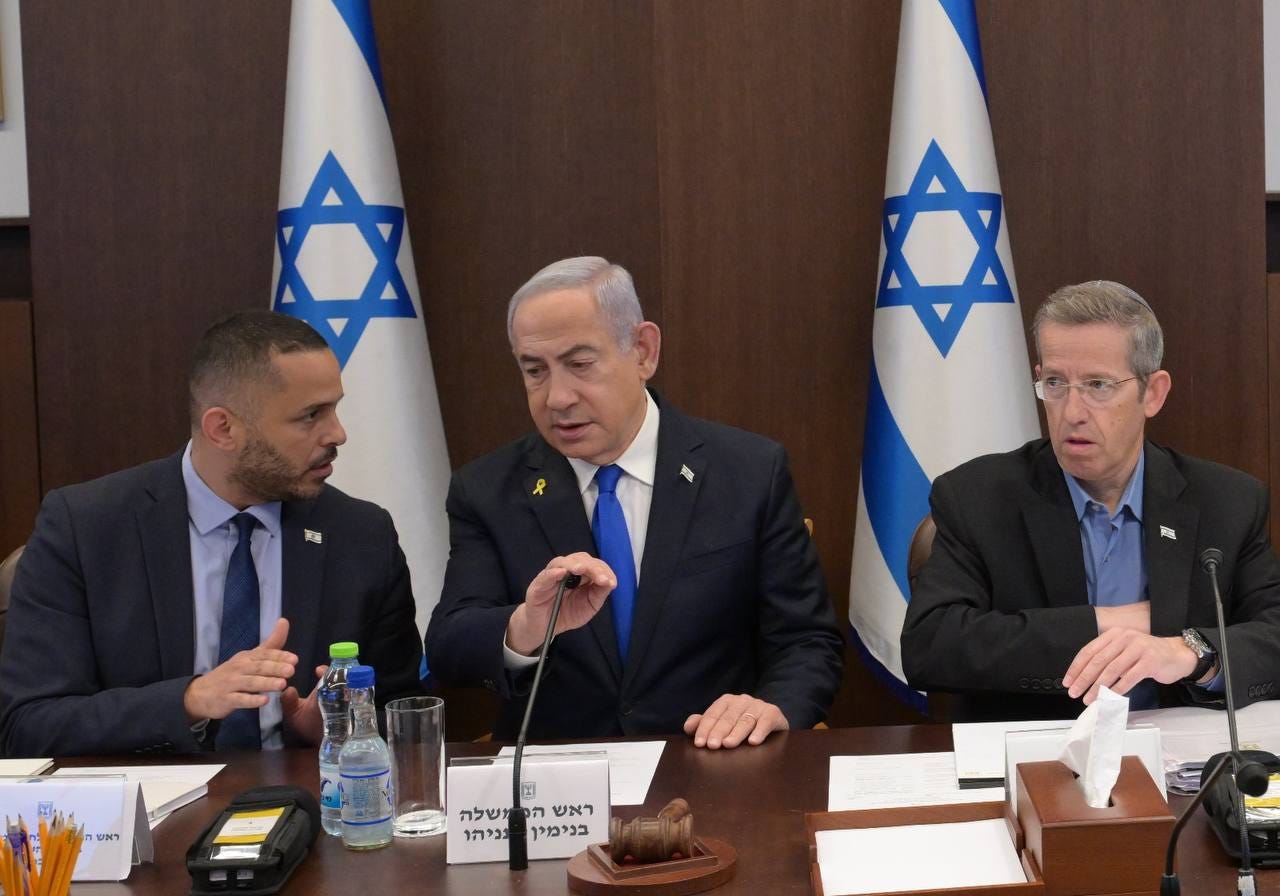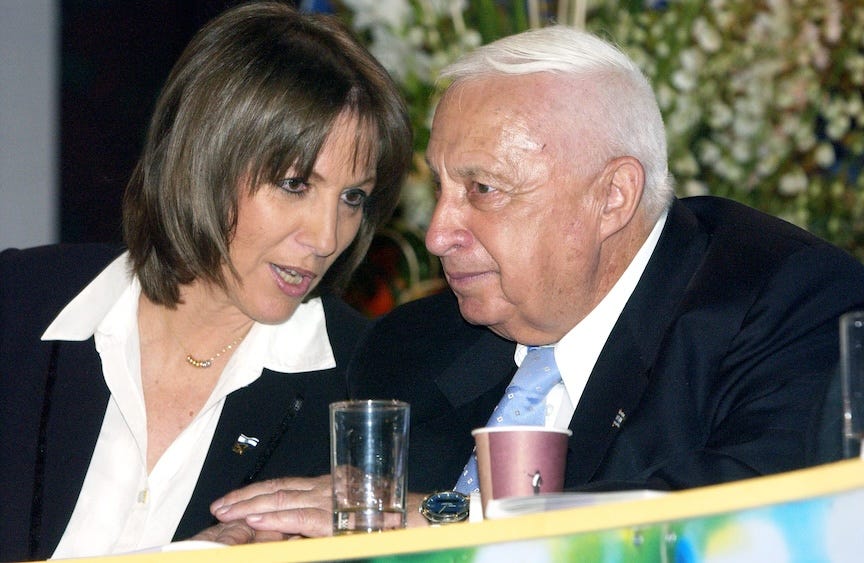DAY 349 OF THE WAR - Fallout From Explosions in Lebanon, Heavy Exchanges in the North, Iranian Plot Thwarted, Fighting Crime in Arab Israeli Sector
Tel Aviv Diary, September 19, 2024
ZOOM BRIEFING— Sunday, September 22nd • 6 PM Israel, 4 PM GB, 11 AM EDT, 8 AM PDT
Following two consecutive days of widespread targeted explosions impacting electronic communication devices in Lebanon, Hezbollah is still assessing the situation to understand what happened and how. Nasrallah spoke this evening, here is what he said:
Israel has crossed all red lines; this is a major act of terror amounting to a ‘declaration of war.’ We have established investigative committees. We are examining all scenarios. Soon we will reach conclusions, the results of the investigation, and uncover the truth.
There is no doubt that we have taken a heavy blow. An unprecedented blow in Lebanon and in the confrontation with the enemy. The Israeli enemy crossed all red lines by detonating communication devices and pagers. Some of the pagers exploded in hospitals.
As a result, dozens were killed, including civilians. Thousands were injured. The enemy believed that 4,000 pagers were in the possession of Hezbollah operatives. It intended to kill 4,000 people in one minute. That was its intention.
We know that the enemy has technological superiority. We acknowledge that. On our side, we rely on effort, attrition, and sacrifice. One day, the enemy has the upper hand, and one day, we do.
We say to the enemy: the Lebanese front will not cease until the war in Gaza ends. No matter what happens, we will not stop serving as a supporting front. No matter the battles, the odds, the scenarios, or the consequences, this is our response.
I will update that our infrastructure is vast and extensive. What happened did not affect our capabilities, control, or readiness. I say this to both the enemy and our allies.
I say to Netanyahu and Gallant: you will not succeed in returning the settlers to their homes in the north, no matter what you do. I challenge you. The only way for that to happen, as we said on October 8th, is to stop the war in Gaza.
Without a doubt, what happened is a great and unprecedented act of aggression, and in response, there will be a significant and just reckoning. However, because this war was carried out with hidden faces, I will not speak of the manner, form, place, or time. But you will know when you see and hear it.
While Nasrallah delivered his speech, the Israeli Air Force conducted a series of attacks in southern Lebanon, with fighter jets breaking the sound barrier over Beirut.
Tonight, the Air Force conducted a new round of attacks on Southern Lebanon, which have been described as the heaviest of the war, with the Air Force reportedly striking 100 rocket launchers containing 1,000 rockets.
Throughout the day, there were several serious attacks along the northern border, in which we tragically suffered casualties. Major (res.) Nael Fwarsy (43), from Maghar, and Sergeant Tomer Keren (20), from Haifa, were killed.
As of 6 PM, there had been 17 separate barrages targeted at the North. Tonight, Metula was hit by anti-tank missiles, one of them directly hit the Magen David Adom facility there, and wounded one person. A second attack on Meutula caused heavy damage late tonight.
Additionally, there was an attempt to place explosive charges along the border, which resulted in the deaths of the Hezbollah members involved.
Today's speech by Nasrallah marked a departure from his usual tone. He acknowledged that Hezbollah had sustained significant damage and displayed less defiance than he had in the past. Moreover, Nasrallah explicitly stated his willingness to end this war if an agreement could be reached regarding Gaza— emphasizing, “It's the only viable way to end this.”
CONTINUED HOSTAGE NEGOTIATIONS
It has been reported that the Israeli government has presented a new proposal to the U.S. regarding the hostages. The plan calls for the release of all hostages in exchange for an end to the war and safe passage for Yahya Sinwar, along with other key Hamas figures out of Gaza. Additionally, Israel would release Palestinian prisoners. The Hostage Families Coordinating Forum has strongly endorsed the proposal, urging all government ministers to support it. While it seems unlikely that Sinwar would consent to leave Gaza, this plan at least demonstrates Israeli initiative and offers a potential path toward ending the conflict.
UTTERLY BEYOND BELIEF — IRANIAN PLOT THWARTED
The Shin Bet (Security Services) has announced a significant arrest. Moti Maman, a 73-year-old man from Ashkelon, is accused of being recruited by Iran to conduct activities on their behalf in Israel. Here is the announcement issued by the Shin Bet regarding Moti Maman:
It has been cleared for publication that as part of a joint counterintelligence operation by the Israel Security Agency (Shin Bet) and the National Crime Unit (YAHBAL) of the Israeli Police, an Israeli citizen was arrested in August 2024 on suspicion of committing security offenses related to contact with Iranian intelligence operatives.
What emerged from the investigation:
In the course of an investigation led by the Shin Bet and YAHBAL, it was revealed that the citizen is a businessman who had lived for an extended period in Turkey and maintained business and social relations with individuals of Turkish and Iranian origin.
As part of these relationships, in April 2024, the citizen, through the mediation of the Turks Andrei Farouk Aslan and Cuneyd Aslan, agreed to meet with a wealthy businessman living in Iran named Edi to promote business activity. To advance this business, he [Maman] traveled to the city of Samandağ in Turkey, where he met two representatives sent by Edi and held a phone conversation with Edi, who was unable to leave Iran.
Further investigation revealed that in May 2024, he traveled to Turkey again, where he met with Andrei, Cuneyd, and Edi’s two representatives. After it became clear that Edi could not leave Iran for Turkey once more, the Israeli citizen was smuggled by car through a land border near the city of Van in eastern Turkey into Iran, where he met with Edi and another person named Hajjah, who was introduced as an operative from Iranian security services.
The two meetings in Iran and the missions the Israeli was asked to carry out:
The Israeli and others traveled to Edi’s home in Iran, where a meeting took place during which he was introduced as an Israeli citizen. In this meeting, Edi proposed to the Israeli various security-related tasks within Israel for the Iranian regime, including: transferring money or a gun to pre-arranged locations, taking photographs of crowded places in Israel and sending them to Iranian agents, and threatening other Israeli citizens working for the Iranian regime who had not completed their assigned tasks. The Israeli requested time to consider these proposals.
It was further revealed in his interrogation that in August 2024, the Israeli citizen entered Iran for the second time, again smuggled through a land border, hidden inside the cab of a truck. While staying at Edi’s home in Iran, he met with additional Iranian intelligence agents, who asked him to carry out terror activities for Iran in Israel, including promoting assassination attempts on the Israeli Prime Minister, Benjamin Netanyahu, the Defense Minister, Yoav Gallant, or the head of the Shin Bet, Ronen Bar.
The Iranian intelligence agents also asked him to explore the possibility of assassinating other prominent figures, such as former Prime Minister Naftali Bennett and other public figures, as revenge for the assassination of Ismail Haniyeh on Iranian soil in July 2024, which Iranian authorities attributed to Israel. The Israeli citizen demanded an advance payment of one million dollars before carrying out any operations.
The following day, the Israeli had another meeting with Iranian intelligence agents, where they reiterated their proposal to assassinate high-ranking officials. They also considered the possibility that he could hide funds in various locations in Israel for others, find Russian or American operatives to eliminate opponents of the Iranian regime in Europe and the U.S., and recruit a Mossad agent to become a “double agent.” In this meeting as well, the Israeli demanded an advance payment of one million dollars, but the Iranian agents refused his request and told him they would contact him in the future. Before leaving Iran, he received 5,000 euros from Edi and the Iranian intelligence representative for his participation in the meetings.
On September 19, 2024, a serious security indictment was filed against him.
A senior Shin Bet official stated:
This is a very serious case that exemplifies the significant efforts made by Iranian intelligence to recruit Israeli citizens to promote terror activities in Israel. Security officials believe that the Iranians will continue their efforts to recruit operatives in Israel for intelligence gathering and terror operations, including targeting individuals with criminal backgrounds for these tasks.
While Israel is engaged in warfare on multiple fronts, an Israeli citizen made two separate trips to an enemy state, met with Iranian intelligence agents, and expressed willingness to carry out serious acts of terrorism on Israeli soil. His actions aided Iran and its intelligence agencies in their campaign against Israel.
It is important to emphasize that any collaboration between Israelis and Iranian agents during a time of war constitutes a severe security offense, this is also the case whether the motive for the contact is criminal or business-related.
The Shin Bet takes a very serious view of any contact between Israelis and Iranian agents, emphasizing that a business pretext or criminal platform does not lessen the severity of the actions and the danger they pose. Any collaboration with these agents is considered extremely serious.
RISING CRIME IN ARAB COMMUNITIES
The Prime Minister called a special meeting to discuss the escalating crime rates within the Arab Israeli communities. Minister of National Security Itamar Ben-Gvir refused to attend and instructed the new Police Commissioner to abstain from attending as well. According to the Prime Minister’s office, the following issues were discussed:
At the start of the discussion, the Prime Minister and ministers were updated by the Attorney General on the advancement of ten laws in various areas that will assist in the fight against serious crime. Additionally, Prime Minister Netanyahu instructed the Finance Minister, the Governor of the Bank of Israel, the Director-General of the Prime Minister's Office, the Tax Authority, and the Office for the Fight Against Crime in Arab Society in the Prime Minister's Office to hold a separate discussion to examine the issue of eliminating the 200-Shekel bill as part of the fight against black market money.
Following claims raised during the discussion regarding the implementation of funds from the five-year plans for the Arab community, Prime Minister Netanyahu instructed the head of the Office for the Fight Against Crime in Arab Society, Roi Kahlon, to present a detailed report at the next meeting on the utilization of the transferred funds.
In addition, Prime Minister Netanyahu requested that, in the next discussion, long-term plans be presented for strengthening education, welfare, and employment as key areas for preventing crime and violence in Arab society.
BUSINESS
Valens
Valens, a developer of audio-video chips who is publicly traded on Wall Street, reports that three leading European car manufacturers will integrate its chip into their future vehicles. The identities of the manufacturers have not been disclosed. Revenue from the agreement depends on the production volume of the relevant models, which will hit the road starting in 2026. The company’s estimate is that under mass production, this would involve about half a million cars per year, with revenues amounting to approximately $10 million per year, over five to seven years.
Valens has been active in the automotive industry by integrating its chips into vehicle multimedia systems, enables high-speed, large-scale data transfer while minimizing the need for extensive cabling and connection systems within the car. This same technology, previously used for video transmission in multimedia, will now be applied to driver assistance systems (ADAS), supporting features like cruise control, lane departure correction, parking assistance, and more.
Brown Hotel Chain
The Brown Hotel chain, known for its successful specialty hotels in Israel and Greece, has been severely affected by COVID-19 and a subsequent decline in tourism due to the war. While the larger hotels in the chain were able to profitably accommodate Israelis displaced from their homes, the smaller Brown hotels could not do the same and consequently accumulated a debt of NIS 100 million.
As a result, the Brown chain is now being sold to Israel Canada Hotels (ICH). On Thursday, ICH signed a memorandum of understanding to acquire the Brown brand. This acquisition includes its customer loyalty club, website, and a selection of its hotels—eight hotels in Greece with a total of 1,076 rooms, and ten hotels in Tel Aviv and Jerusalem, totaling 779 rooms. The financial details of the deal were not disclosed, but it is estimated to be around 100 million shekels.
Playtika
Playtika, the Israeli gaming company traded on Wall Street with a valuation of $3 billion, announced last night (Wednesday) that it will acquire the mobile gaming company SuperPlay, based in Tel Aviv. The deal is for $700 million, with an additional conditional payment that could reach $1.25 billion, subject to achieving specific financial targets defined over three years.
This represents a high return for investors, as SuperPlay has raised approximately $50 million to date, and its valuation in the last funding round was around $200 million. According to estimates, SuperPlay’s annual revenue rate has exceeded $300 million. SuperPlay boasts two hit game titles: Dice Dreams, a fast-growing entry in the coin collection genre, and Domino Dreams, a widely popular board game. Two additional games are currently in development. Both Dice Dreams and Domino Dreams saw explosive growth in 2024, collectively reaching a peak of 1.7 million average daily active users in August.
∞–––––∞–––––∞–––––∞–––––∞–––––∞–––––∞–––––∞–––––∞–––––∞
A PIECE OF HISTORY
Sharon Presents Disengagement Plan
Throughout 2002 and 2003, Prime Minister Ariel Sharon was becoming increasingly frustrated over negotiations with the Palestinians. Sharon had concluded that Arafat and the Palestinian Authority were either unwilling or unable to enforce any agreed-upon terms. Despite promises from the PA to crack down, groups like Hamas and Islamic Jihad continued to carry out bombings. Arafat's contradictory communications with the foreign press and his own people further complicated matters, Meanwhile, Sharon viewed the security situation in Gaza as intolerable. Once a strong advocate for widespread settlements in both the West Bank and Gaza, Sharon was now questioning the wisdom of maintaining some of them.
With the prodding from his son Gilad, who first introduced the idea of the Israeli government taking unilateral action, Sharon became convinced that this was the only solution for Gaza. On November 17th 2003, Sharon met Elliot Abrams in Italy and presented his plan for an Israeli unilateral withdrawal from Gaza. Although the Americans were skeptical, they were willing to go along with the plan. On December 18, 2003 at the Herzilya Conference, Sharon publicly presented the plan for the first time. It is worthwhile to read Sharon’s speech in full:
Good Evening,
I congratulate the organizers of this conference for the important and interesting gathering which you have held here. During the past three days, you have been discussing Israels situation. I, as Prime Minister, am responsible for the planning and implementation of the measures which will shape Israels character during the next few years.We are all entrusted with the duty of shaping the face of the Jewish and democratic State of Israel a state where there is an equal distribution of the burden, as well as the acceptance of rights and shouldering of duties by all sectors, through different forms of national service. A state where there is a good and efficient education system which educates a young generation imbued with values and national pride, which is capable of confronting the challenges of the modern world. A country whose economy is adapted to the advanced global market of the 21st century, where the product per capita crosses the $20,000 line and is equal to that of most developed European countries. An immigrant-absorbing state which constitutes a national and spiritual center for all Jews of the world and is a source of attraction for thousands of immigrants each year. Aliyah is the central goal of the State of Israel.
This is the country we wish to shape. This is the country where our children will want to live.
I know that there is sometimes a tendency to narrow all of Israels problems down to the political sphere, believing that once a solution is found to Israels problems with its neighbors, particularly the Palestinians, the other issues on the agenda will miraculously resolve themselves. I do not believe so. We are facing additional challenges, which must be addressed the economy, educating the young generation, immigrant absorption, enhancement of social cohesion and the improvement of relations between Arabs and Jews in Israel.
Like all Israeli citizens, I yearn for peace. I attach supreme importance to taking all steps, which will enable progress toward resolution of the conflict with the Palestinians. However, in light of the other challenges we are faced with, if the Palestinians do not make a similar effort toward a solution of the conflict I do not intend to wait for them indefinitely.
Seven months ago, my Government approved the Roadmap to peace, based on President George Bush’s June 2002 speech. This is a balanced program for phased progress toward peace, to which both Israel and the Palestinians committed themselves. A full and genuine implementation of the program is the best way to achieve true peace. The Roadmap is the only political plan accepted by Israel, the Palestinians, the Americans and a majority of the international community. We are willing to proceed toward its implementation: two states Israel and a Palestinian State living side by side in tranquility, security and peace.
The Roadmap is a clear and reasonable plan, and it is therefore possible and imperative to implement it. The concept behind this plan is that only security will lead to peace. And in that sequence. Without the achievement of full security within the framework of which terror organizations will be dismantled it will not be possible to achieve genuine peace, a peace for generations. This is the essence of the Roadmap. The opposite perception, according to which the very signing of a peace agreement will produce security out of thin air, has already been tried in the past and failed miserably. And such will be the fate of any other plan which promotes this concept. These plans deceive the public and create false hope. There will be no peace before the eradication of terror.
The government under my leadership will not compromise on the realization of all phases of the Roadmap. It is incumbent upon the Palestinians to uproot the terrorist groups and to create a law-abiding society, which fights against violence and incitement. Peace and terror cannot coexist. The world is currently united in its unequivocal demand from the Palestinians to act toward the cessation of terrorism and the implementation of reforms. Only a transformation of the Palestinian Authority into a different authority will enable progress in the political process. The Palestinians must fulfill their obligations. A full and complete implementation will at the end of the process lead to peace and tranquility.
We began the implementation of the Roadmap at Aqaba, but the terrorist organizations joined with Yasser Arafat and sabotaged the process with a series of the most brutal terror attacks we have ever known.
Concurrent with the demand from the Palestinians to eliminate the terror organizations, Israel is taking and will continue to take steps to significantly improve the living conditions of the Palestinian population: Israel will remove closures and curfews and reduce the number of roadblocks; we will improve freedom of movement for the Palestinian population, including the passage of people and goods; we will increase the hours of operation at international border crossings; we will enable a large number of Palestinian merchants to conduct regular and normal economic and trade relations with their Israeli counterparts, etc. All these measures are aimed at enabling better and freer movement for the Palestinian population not involved in terror.
In addition, subject to security coordination, we will transfer Palestinian towns to Palestinian security responsibility.
Israel will make every effort to assist the Palestinians and to advance the process.
Israel will fulfill the commitments taken upon itself. I have committed to the President of the United States that Israel will dismantle unauthorized outposts. It is my intention to implement this commitment. The State of Israel is governed by law, and the issue of the outposts is no exception. I understand the sensitivity; we will try to do this in the least painful way possible, but the unauthorized outposts will be dismantled. Period.
Israel will meet all its obligations with regard to construction in the settlements. There will be no construction beyond the existing construction line, no expropriation of land for construction, no special economic incentives and no construction of new settlements.
I take this opportunity to appeal to the Palestinians and repeat, as I said at Aqaba: it is not in our interest to govern you. We would like you to govern yourselves in your own country. A democratic Palestinian state with territorial contiguity in Judea and Samaria and economic viability, which would conduct normal relations of tranquility, security and peace with Israel. Abandon the path of terror and let us together stop the bloodshed. Let us move forward together towards peace.
We wish to speedily advance implementation of the Roadmap towards quiet and a genuine peace. We hope that the Palestinian Authority will carry out its part. However, if in a few months the Palestinians still continue to disregard their part in implementing the Roadmap then Israel will initiate the unilateral security step of disengagement from the Palestinians.
The purpose of the Disengagement Plan is to reduce terror as much as possible, and grant Israeli citizens the maximum level of security. The process of disengagement will lead to an improvement in the quality of life, and will help strengthen the Israeli economy. The unilateral steps which Israel will take in the framework of the Disengagement Plan will be fully coordinated with the United States. We must not harm our strategic coordination with the United States. These steps will increase security for the residents of Israel and relieve the pressure on the IDF and security forces in fulfilling the difficult tasks they are faced with. The Disengagement Plan is meant to grant maximum security and minimize friction between Israelis and Palestinians.
We are interested in conducting direct negotiations, but do not intend to hold Israeli society hostage in the hands of the Palestinians. I have already said we will not wait for them indefinitely.
The Disengagement Plan will include the redeployment of IDF forces along new security lines and a change in the deployment of settlements, which will reduce as much as possible the number of Israelis located in the heart of the Palestinian population. We will draw provisional security lines and the IDF will be deployed along them. Security will be provided by IDF deployment, the security fence and other physical obstacles. The Disengagement Plan will reduce friction between us and the Palestinians.
This reduction of friction will require the extremely difficult step of changing the deployment of some of the settlements. I would like to repeat what I have said in the past: In the framework of a future agreement, Israel will not remain in all the places where it is today. The relocation of settlements will be made, first and foremost, in order to draw the most efficient security line possible, thereby creating this disengagement between Israel and the Palestinians. This security line will not constitute the permanent border of the State of Israel, however, as long as implementation of the Roadmap is not resumed, the IDF will be deployed along that line. Settlements which will be relocated are those, which will not be included in the territory of the State of Israel in the framework of any possible future permanent agreement. At the same time, in the framework of the Disengagement Plan, Israel will strengthen its control over those same areas in the Land of Israel which will constitute an inseparable part of the State of Israel in any future agreement. I know you would like to hear names, but we should leave something for later.
Israel will greatly accelerate the construction of the security fence. Today we can already see it taking shape. The rapid completion of the security fence will enable the IDF to remove roadblocks and ease the daily lives of the Palestinian population not involved in terror.
In order to enable the Palestinians to develop their economic and trade sectors, and to ensure that they will not be exclusively dependent on Israel, we will consider, in the framework of the Disengagement Plan, enabling in coordination with Jordan and Egypt the freer passage of people and goods through international border crossings, while taking the necessary security precautions.
I would like to emphasize: the Disengagement Plan is a security measure and not a political one. The steps which will be taken will not change the political reality between Israel and the Palestinians, and will not prevent the possibility of returning to the implementation of the Roadmap and reaching an agreed settlement.
The Disengagement Plan does not prevent the implementation of the Roadmap. Rather, it is a step Israel will take in the absence of any other option, in order to improve its security. The Disengagement Plan will be realized only in the event that the Palestinians continue to drag their feet and postpone implementation of the Roadmap.
Obviously, through the Disengagement Plan the Palestinians will receive much less than they would have received through direct negotiations as set out in the Roadmap. According to circumstances, it is possible that parts of the Disengagement Plan that are supposed to provide maximum security to the citizens of Israel will be undertaken while also attempting to implement the Roadmap.
Ladies and Gentlemen, My life experience has taught me that for peace, as well as for war, we must have broad consensus. We must preserve our unity, even in the midst of a difficult, internal debate. In the past three years, the Palestinian terrorist organizations have put us to a difficult test. Their plan to break the spirit of Israeli society has not succeeded. The citizens of Israel have managed to step into the breach, support each other, lend a helping hand, volunteer and contribute.
I believe that this path of unity must be continued today. Whether we will be able to advance the Roadmap, or will have to implement the Disengagement Plan, experience has taught us that, together, through broad national consensus, we can do great things.
Let us not be led astray. Any path will be complicated, strewn with obstacles, and obligate us to act with discretion and responsibility. I am confident that, just as we have managed to overcome the challenges of the past, we will stand together and succeed today.
We will always be guided by the words of Prime Minister David Ben-Gurion, who said, on the day after the Declaration of Independence:
These days, our purpose is only to build the State of Israel with love and faith, in Jewish brotherhood, and to defend it with all our spirit, and as long as necessary. We are still in the midst of a difficult battle, one that has two fronts: political and military. Let us not embellish our deeds and, of course, our words, with grandiose names. We must remain humble. We achieved what we have achieved by standing on the shoulders of previous generations, and we accomplished what we have accomplished by preserving our precious legacy, the legacy of a small nation which has endured suffering and tribulations, but which is, nevertheless, great and eternal in spirit, vision, faith and virtue.
I am also a great believer in the resilience of this small, brave nation, which has endured suffering and tribulations. I am confident that, united in the power of our faith, we will be able to succeed in any path we choose.
Thank you very much, and happy Hanukkah.









As always, great reporting, Marc! Much appreciated.